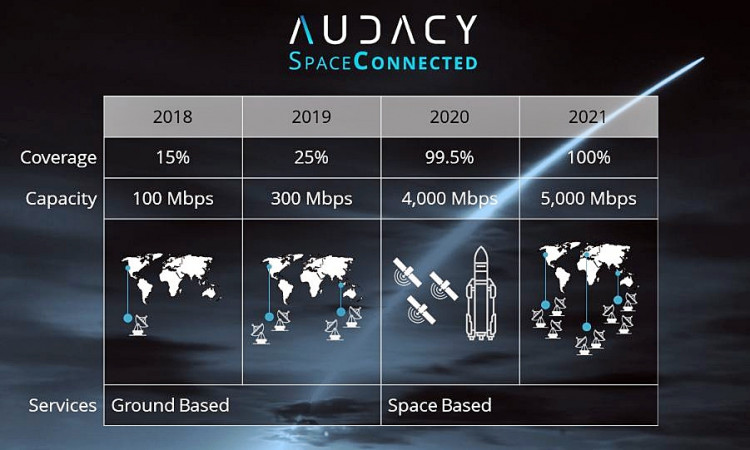An American start-up has received a license from the U.S. government to provide the first internet-style service in space.
The California-based firm called "Audacy" wants to enable continuous data access to spacecraft anywhere across the Earth-Moon space via its own satellite constellation and a series of ground stations.
Audacy said its relay satellites are purpose-built and highly capable space-to-space communications nodes. The first generation of these satellites will see a total of three satellites provide complete coverage anywhere from the ground out to 10,000-kilometer orbit. Beyond this distance, the link will seamlessly transition to ground stations providing connectivity as far as lunar distances.
Audacy will deploy its constellation in a unique 3:1 harmonic resonance Medium Earth Orbit (MEO). In this 14,000 km high orbit, all satellites can stay connected with the ground and each other. Multiple signal pathways are used for network resilience. The Audacy constellation will provide high-availability mission-critical communications to users in near-Earth space.
The company was formed in 2015 to deliver anytime, seamless space connectivity. Audacy started out as a student project in the Startup Garage of Stanford University. Ralph Ewig from the Stanford Graduate School of Business, and James Spicer and Sam Avery from the Master's program in Aeronautics and Astronautics are the company's co-founders. Among the co-founders were NASA award winners and SpaceX veterans.
Audacy claims its space internet network will be fully operational by 2020. The U.S. Federal Communications Commission (FCC) gave Audacy a license to operate earlier this month.
Audacy's network will have two ground stations in San Francisco and Singapore. These stations will communicate with three linked MEO satellites scheduled for launch in 2019. Ewig said Audacy will deploy satellites at a high orbit that acts very much like cell towers on the top of a hill.
Ewig said the customers for Audacy's space internet service are firms running Earth observation satellites. Other customers will be space companies that want to stay in constant contact with their launch vehicles.
Audacy will launch two test satellites before launching its three main satellites in 2019. Audacy Zero, the first test satellite, will hurtle into space aboard a Space X Falcon 9 rocket in the next few weeks. It will test radio spectrum and communication with ground stations.
ON the other hand, Audacy Lynq, the second sat, will be installed on the International Space Station (ISS) to give commercial firms the use of up to 100 megabytes per second of send and receive data to carry out experiments in space.






